Collaborations / Working Groups
Rock Ethics Institute
As a faculty member in the Rock Ethics Institute, Dr. Cameron leads the research initiative on Moral Agency and Moral Development. This initiative is focused on fostering research collaborations (such as articles and grant applications) about moral experience, deliberation, judgment, and action, and forms of education that support the development of moral agency. The goal of the initiative is to create an interdisciplinary hub of moral psychology research at Penn State.

Consortium on Moral Decision-Making
Starting in the 2023-2024 academic year, Dr. Cameron is launching the Consortium on Moral Decision-Making. The aim of this network is to bring together faculty and students from across disciplines in the social sciences who study moral and ethical decision-making, broadly construed. Sometimes bringing people together from very different disciplinary backgrounds can lead to the formation of novel and theoretically innovative ideas, and that is the explicit goal of the Consortium, to facilitate those conversations. The Consortium will support working groups, seed grants, and regular speaker and lecture events, building from the Moral Agency and Moral Development Initiative. This venture is jointly supported by the Rock Ethics Institute, Social Science Research Institute, and College of the Liberal Arts, with additional funding coming from Penn State’s The McCourtney Institute for Democracy and the Department of Philosophy. If you are a faculty or student who would like to get involved in the Consortium, please contact Dr. Cameron for more details.
In our first meeting on March 17, 2023, we had nearly 30 Penn State faculty members from a range of disciplines attend in person and on Zoom, including psychology, philosophy, poltical science, media studies, engineering, communication arts and science, sociology, history and anthropology, human development and family studies, business, and hospitality management. To learn more, read this initial SSRI press release.
More recently, Dr. Cameron and Dr. Andrew High (Communication Arts and Sciences) received a Level 4 “Interdisciplinary Research Initiative” grant from the SSRI to support the continued expansion of the Consortium through the pursuit of center and training grants (the latter for the development and training of early career researchers) Additionally, we have since launched a seed grant program for interdisciplinary research projects, which the SSRI team wrote about here: https://ssri.psu.edu/news/consortium-moral-decision-making-call-seed-grants. EMP Lab member Eliana Hadjiandreou wrote about our broader EMP Lab and Consortium goals in a nice longer piece for the Rock Ethics Institute here: https://rockethics.psu.edu/news/new-consortium-focusing-on-ethical-decisions-empathy/. Most recently, the SSRI team wrote about our plans for spring 2024, which include the return of the Expanding Empathy speaker series, as well as an AI & empathy conference in April 2024: https://www.psu.edu/news/social-science-research-institute/story/moral-decision-making-consortium-advances-events-seed/.
You can learn more about the Consortium aims, membership, events, and opportunities to get involved at:
https://moralconsortium.psu.edu/
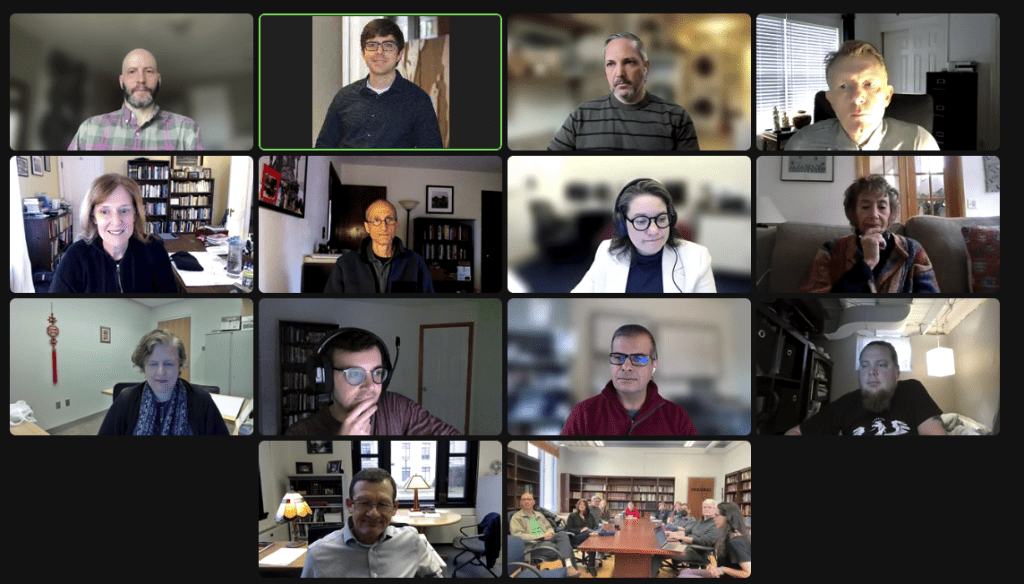

moral psychology joint lab meetings
Our lab works with Dr. Sean Laurent’s Morality and Social Cognition Laboratory (https://seanmlaurent.com/), holding semi-regular joint meetings between the EMP Lab and MASC Lab. One of our long-term aims is building a cluster of moral psychology here in the Psychology Department at Penn State. If you’re interested in getting multiple perspectives on topics in empathy and moral psychology research, reach out to get involved!
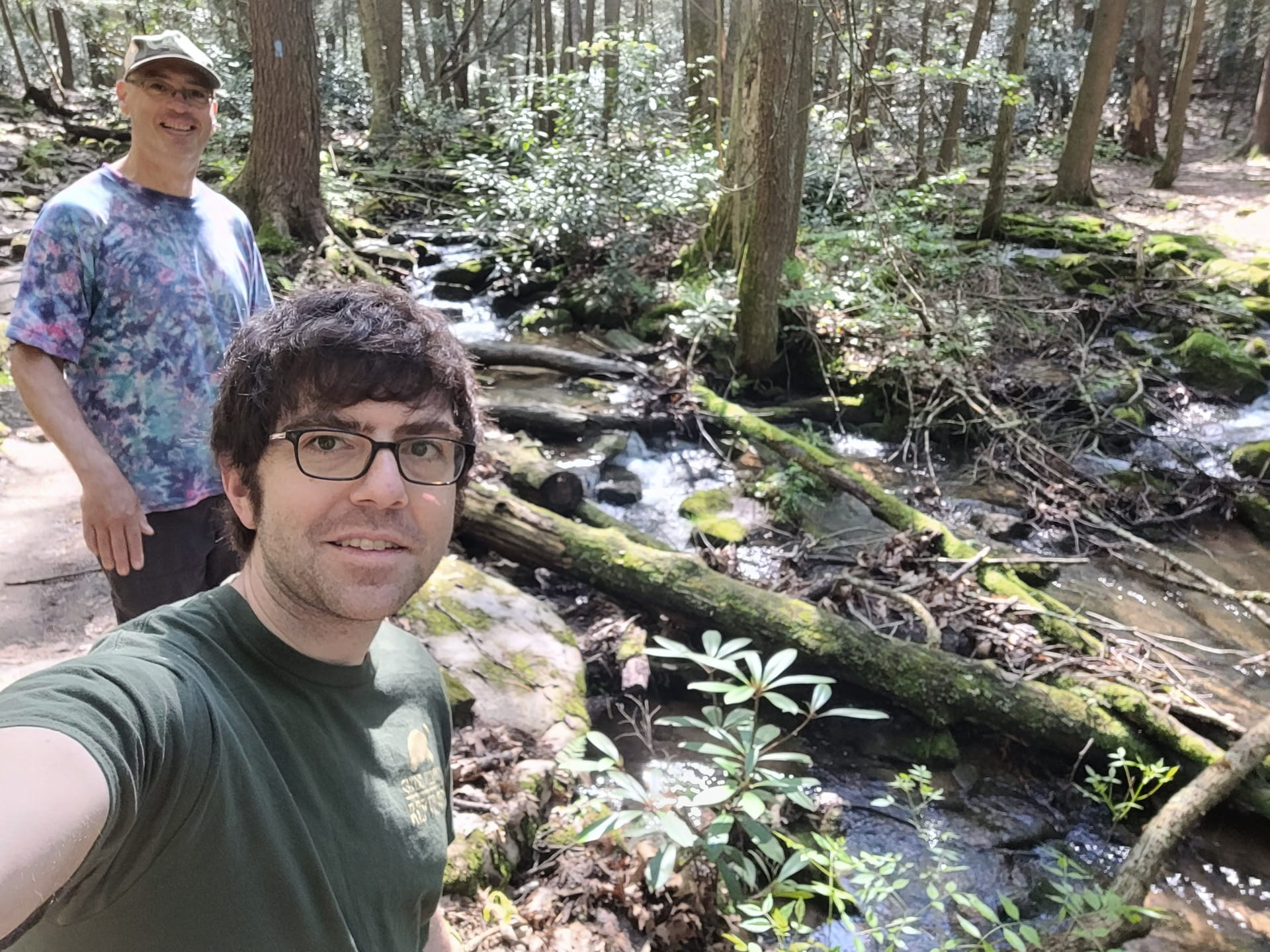
interdisciplinary compassion collective
Since 2016, Dr. Cameron has been working with colleagues in Human Development and Family Studies, including Dr. Robert Roeser and Dr. Charles Geier, as well as Dr. Jose Soto from clinical psychology. This group convenes regularly to discuss interdisciplinary approaches to studying compassion, empathy, and prosocial behavior. The group also welcomes students, and has included Sinhae Cho, Julian Scheffer, and Eliana Hadjiandreou. They are currently working on a grant funded by the Social Science Research Institute, examining empathy and compassion for social disparities, using a mix of behavioral, physiological, and neuroimaging measures. If you are interested in joining the discussion, reach out!

animal ethics & morality group
When and why do people feel empathy differently for animals and humans? Dr. Cameron has engaged a series of collaborations with Dr. Janet Swim in social psychology, along with Dr. Robert Chiles from the Rock Ethics Institute, to examine empathy for animal suffering and the motivational factors involved. This work has involved numerous graduate students, including Eliana Hadjiandreou, Michael Lengieza, and Joe Guerriero. This work has been supported by the Rock Ethics Institute and a grant from the UCLA Animal Law program. If you are interested in topics related to ethics for animals, and for the environment, please feel free to reach out to Dr. Cameron.

moral psych of human-tech interactions
How do we empathize with the technology that enables our lives? In an interdisciplinary collaboration with Dr. Alan Wagner in Aerospace Engineering (and Rock Ethics Institute), Dr. Cameron is investigating the complicated moral questions at the human-technology intersection. This work is supported by a grant from the Center for Socially Responsible Artificial Intelligence at Penn State. If you are interested in joining the conversation, get in contact!
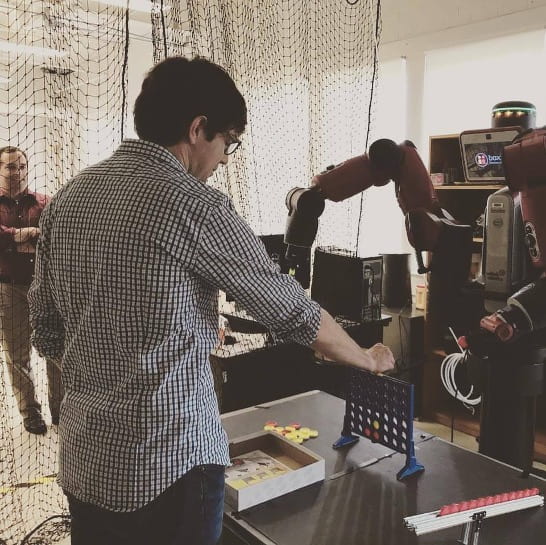
Moral Agency Workshop
The Moral Agency Workshop is an interdisciplinary working group through the Moral Agency & Moral Development Initiative that brings together faculty and graduate students from a diverse range of disciplines to study ethics and morality. In particular, we focus on why and how do people behave in moral and ethical ways? We discuss psychological foundations for the development and sustenance of moral agency, and philosophical conditions for moral agency and responsibility. Currently, our members include faculty and students from psychology, philosophy, political science, sociology, communication and media studies, marketing, bioethics, and anthropology. If you have an interest in empirically and philosophically-informed approaches to these questions, we invite you to join! The workshop will meet every month over coffee at the Rock Ethics Institute, with meeting times and topics announced below. Our meetings involve both assigned readings and members workshopping in-progress ideas that would be usefully and constructively informed by interdisciplinary feedback. This group is designed to encourage active interdisciplinary discussion, and foster the development of grant applications and research projects that transcend traditional boundaries. If you are interested in being part of the group, contact Dr. Cameron for more information.
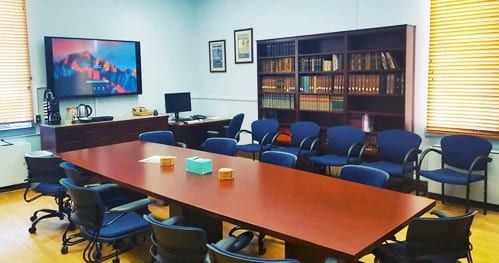
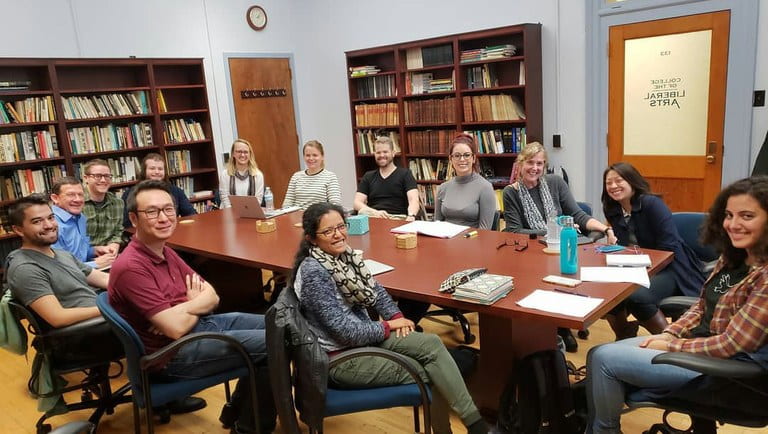

Expanding Empathy speaker series, Spring 2023
The Expanding Empathy speaker series is returning for its fifth year. Building on last year’s format, there will be four panels, each of which has a philosophy and a psychologist each giving a talk on a common theme. There will be plenty of time for interdisciplinary discussion and live Q+A with the audience on Zoom webinar. Details about each panel are below, and the registration links for the free webinars are at the pages linked below. Once again, the goal is to highlight the value of interdisciplinary conversation. The panels will be co-moderated by Dr. Daryl Cameron (Psychology) and Dr. Martina Orlandi (Philosophy, Trent University). A press release for this year’s series is forthcoming.
First Panel: Empathy for Animals
Kristin Andrews (York University), “Empathy for Animal Communities”
&
Kristof Dhont (University of Kent), “Loving and Exploiting Animals: The Ideological and Cultural Underpinnings of Speciesism“

Second Panel: Empathy, Effort, and Common Ground
Patricia Lockwood (University of Birmingham), “How Willing Are We to Put in Effort to Help Others? Prosocial Motivation across the Lifespan and in the Brain“
&
Hannah Read (Duke University), “‘The Benefits and Risks of Empathy and Common Ground“

Third Panel: Moral Learning
Victor Kumar (Boston University), “What We Can Learn from the Historic Decline of Anti-Gay Attitudes“
&
Oriel FeldmanHall (Brown University), “How Emotion Influences Social Learning“

Fourth Panel: Ways to Channel Empathy & Moral Agency
Anat Perry (The Hebrew University of Jerusalem), “The Contribution of Different Information Channels to Empathy and Social Communication“
&
Antti Kauppinen (University of Helsinki), “Empathy, Bias, and Manipulation“

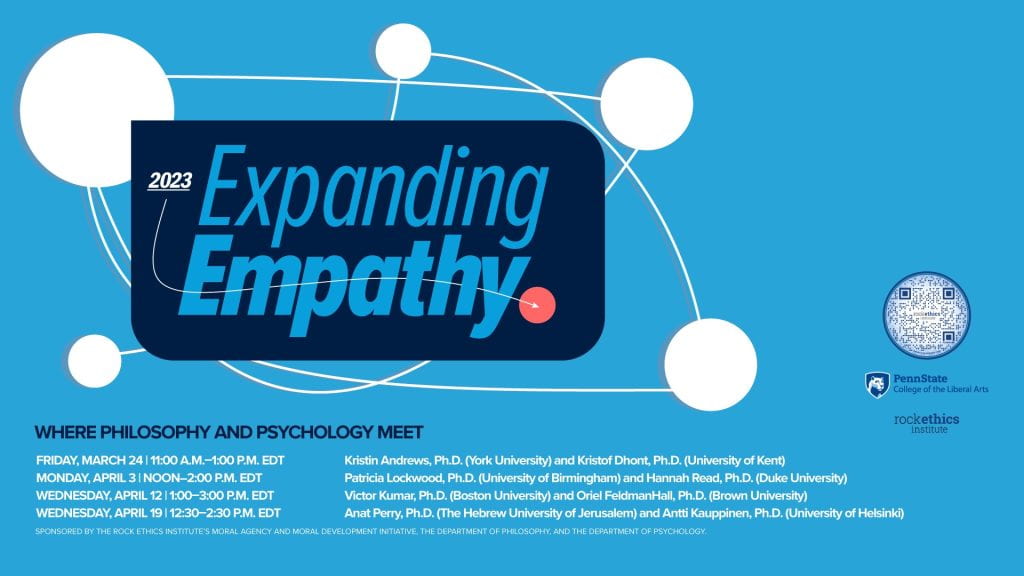
Posters by Tiny Little Hammers design
Expanding Empathy speaker series, Spring 2022
For the past several years, Dr. Cameron has organized the Expanding Empathy Speaker Series through the Moral Agency & Moral Development Initiative. This year, we are trying a new format. Co-organized with philosopher Dr. Martina Orlandi (Post-Doctoral Scholar in Engaged Ethics in the Rock Ethics Institute and Schreyer Honors College), the series brings together four panels. Each panel will have a philosopher and a psychologist each give a talk on a shared theme, and then have time for collaborative conversation with each other and the audience afterward. The goal of this year’s series is to encourage interdisciplinary conversation between disciplines to highlight points of convergence and contrast. Here is the press release about the 2022 series.
First Panel: Empathy, Outrage, Online Emotion
Molly Crockett (Yale University), “Amplification of Digital Outrage: Mechanisms and Consequences”
&
Kathryn Norlock (Trent University), “‘Do You Feel Like I Do?’: The Ethics of Online Bonding”
Here’s the press release about the first panel.
Here’s the Lecture n.7 podcast that Martina Orlandi conducted with Dr. Norlock.
Second Panel: Empathy, Trust, and Interactions
Jason D’Cruz (University at Albany), “Calibrating Trust Through Empathy”
&
Juliana Schroeder (UC Berkeley), “‘The Social Consequences of Mistaken Assumptions About Other Minds”
Here’s the press release about the second panel.
Here’s the Lecture n.7 podcast that Martina Orlandi conducted with Dr. Schroeder, and here is the podcast with Dr. D’Cruz.
Third Panel: Empathy and Ethics
Heidi Maibom (University of Cincinatti), “Perspective in Empathy”
&
Stefan Pfattheicher (Aarhus University), “Promoting welfare during the COVID-19 pandemic: The bright and dark side of empathy”
Here’s the press release about the third panel.
Here’s the Lecture n.7 podcast that Martina Orlandi conducted with Dr. Maibom, and here is the podcast with Dr. Pfattheicher.
Fourth Panel: Empathy and Intergroup Relations
Emma McClure (St. Mary’s University, Halifax), “Witnessing Microaggressions: Practicing Empathetic Resistance”
&
Linda Tropp (University of Massachussetts Amherst), “Empathy and Indifference in Predicting Race and Immigration Policy Attitudes”
Here’s the press release about the final panel.
Here’s the Lecture n.7 podcast that Martina Orlandi conducted with Dr. McClure
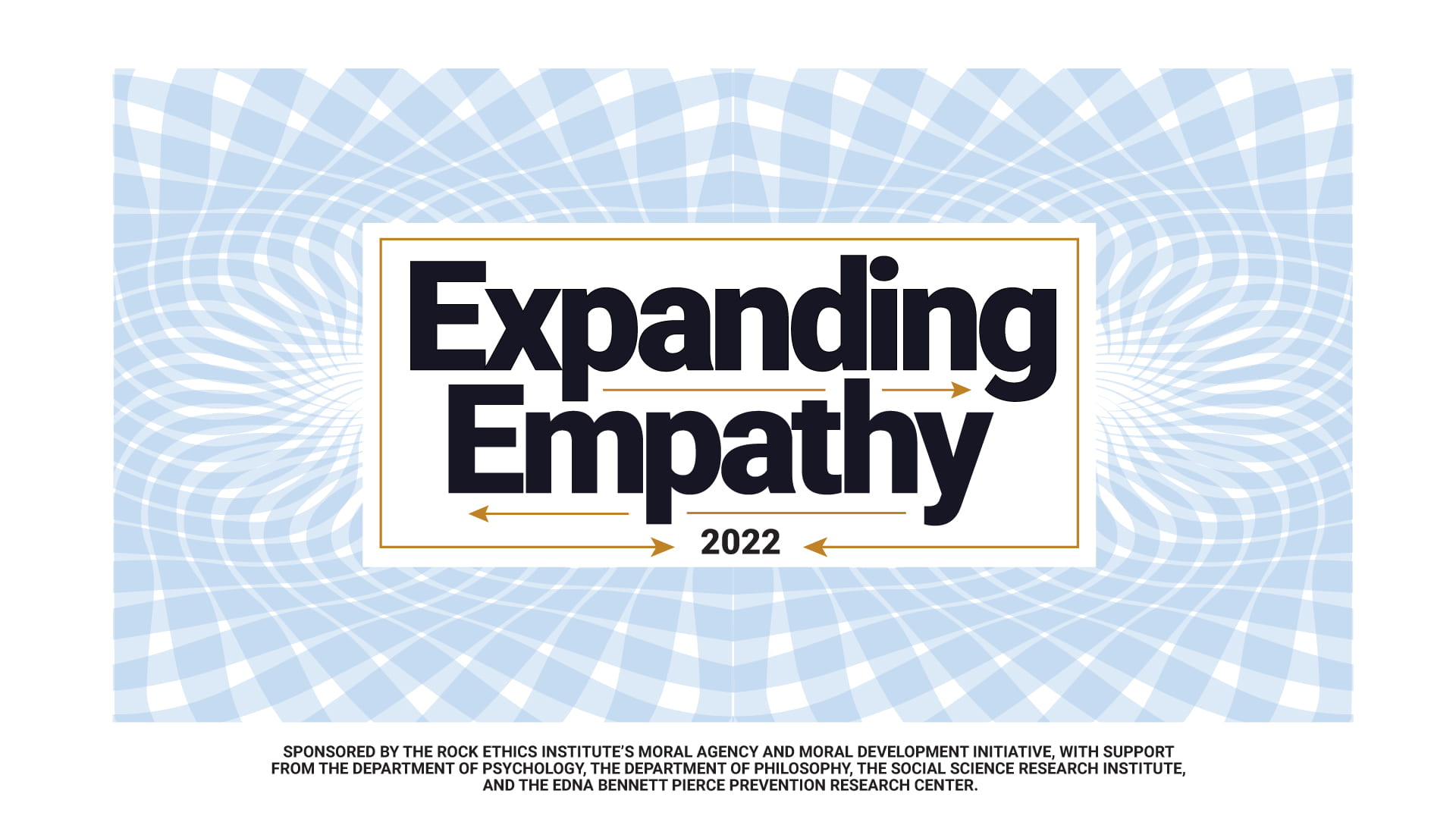
Posters by Tiny Little Hammers design
Expanding Empathy speaker series, Spring 2021
For the past three years, Dr. Cameron has organized the Expanding Empathy Speaker Series through the Moral Agency & Moral Development Initiative. This year, scholars from around the world will visit on Zoom webinar (live and open to public with free registration, with archiving afterward) to talk about the expanse of empathy and the moral circle.
Adam Waytz (Northwestern University), “Humans and machines”
Wednesday, March 3, 3:30pm on Zoom. Register for webinar here: https://bit.ly/EE21Waytz
Here’s the press release about the talk
Liane Young (Boston College), “How social context shapes social cognition”
Wednesday, March 10, 3:30pm on Zoom. Register for webinar here: https://bit.ly/EE21Young
Here’s the press release about the talk
Brock Bastian (University of Melbourne), “Motivational bias in empathy for animals: Understanding the role of need satisfaction and mind perception”
Wednesday, March 17, 3:30pm on Zoom. Register for webinar here: https://bit.ly/EE21Bastian
Here’s the press release about the talk
Tuesday, March 23, 12:30pm on Zoom. Register for webinar here: https://bit.ly/EE21Harris
Here’s the press release about the talk
Wednesday, March 31, 3:30pm on Zoom. Register for webinar here: https://bit.ly/EE21VanBavel
Here’s the press release about the talk
Jim A. C. Everett (University of Kent), “Switching tracks? A two-dimensional model of utilitarian psychology“
Wednesday, April 7, 4pm on Zoom. Register for webinar here: https://bit.ly/EE21Everett
Here’s the press release about the talk
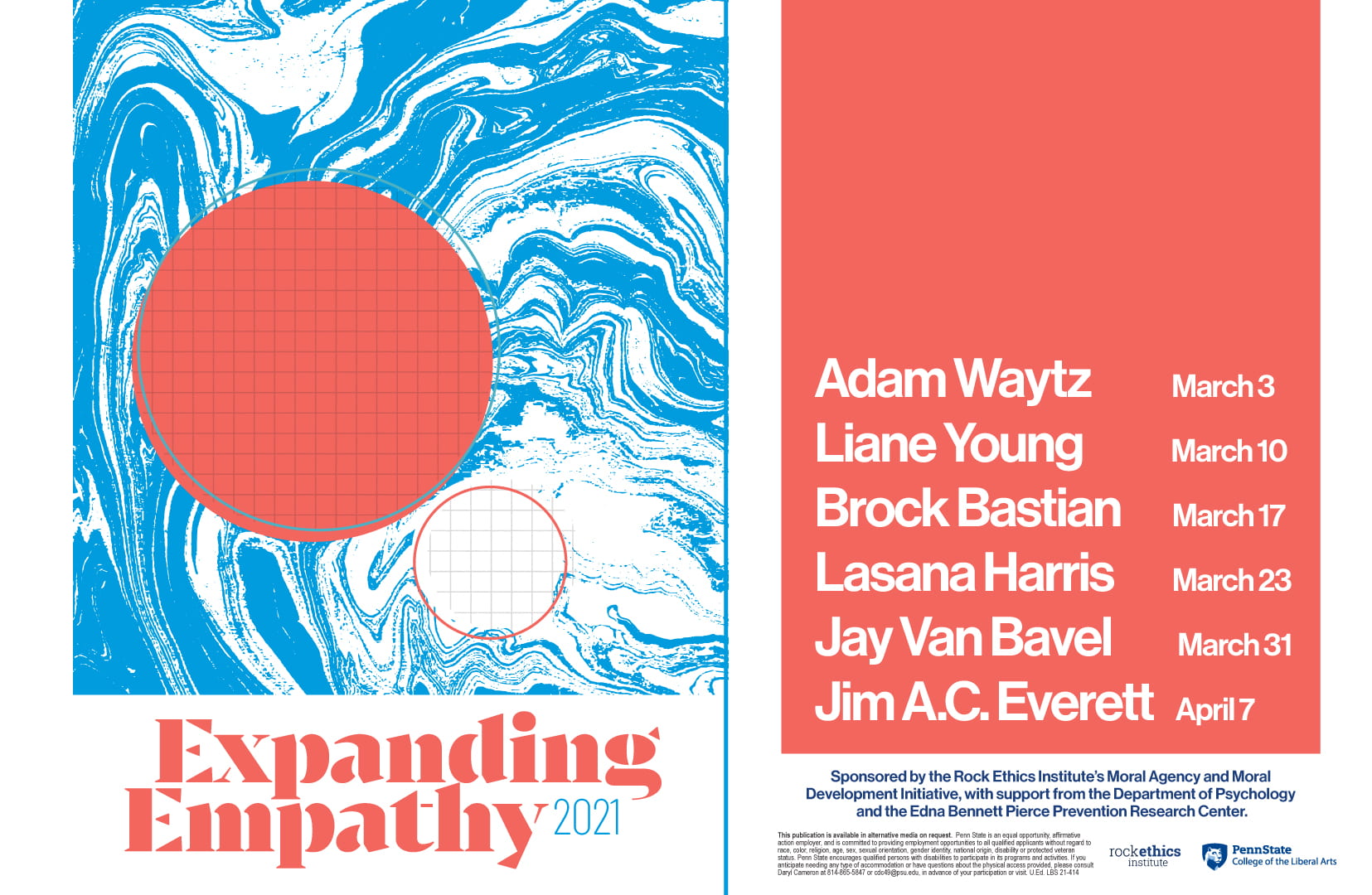
Posters by Tiny Little Hammers design
Expanding Empathy speaker series, Spring 2020
For Penn State News articles about the series click here and here.
Jesse Graham (University of Utah), “Centripetal and Centrifugal Forces in the Moral Circle”
Thursday, March 5, 3:30pm in Foster Auditorium, Paterno Library
Penn State News article about Jesse Graham’s lecture.
Archive of Jesse Graham’s live-stream lecture:
Paul Conway (Florida State University), “Marrying Deontology and Utilitarianism with Virtue Ethics”
Monday, April 27, 1-2:30pm on Zoom Webinar
David DeSteno (Northeastern University), “Hacking Virtue: How Moral Emotions Build Self-Control From the Bottom Up”
Tuesday, April 28, 1-2:30pm on Zoom Webinar
Abigail Marsh (Georgetown University), “The Altruistic Brain”
Wednesday, April 29, 11am-Noon on Zoom Webinar
Expanding Empathy Panel Discussion
Wednesday, April 29, 1-2:30pm on Zoom Webinar:
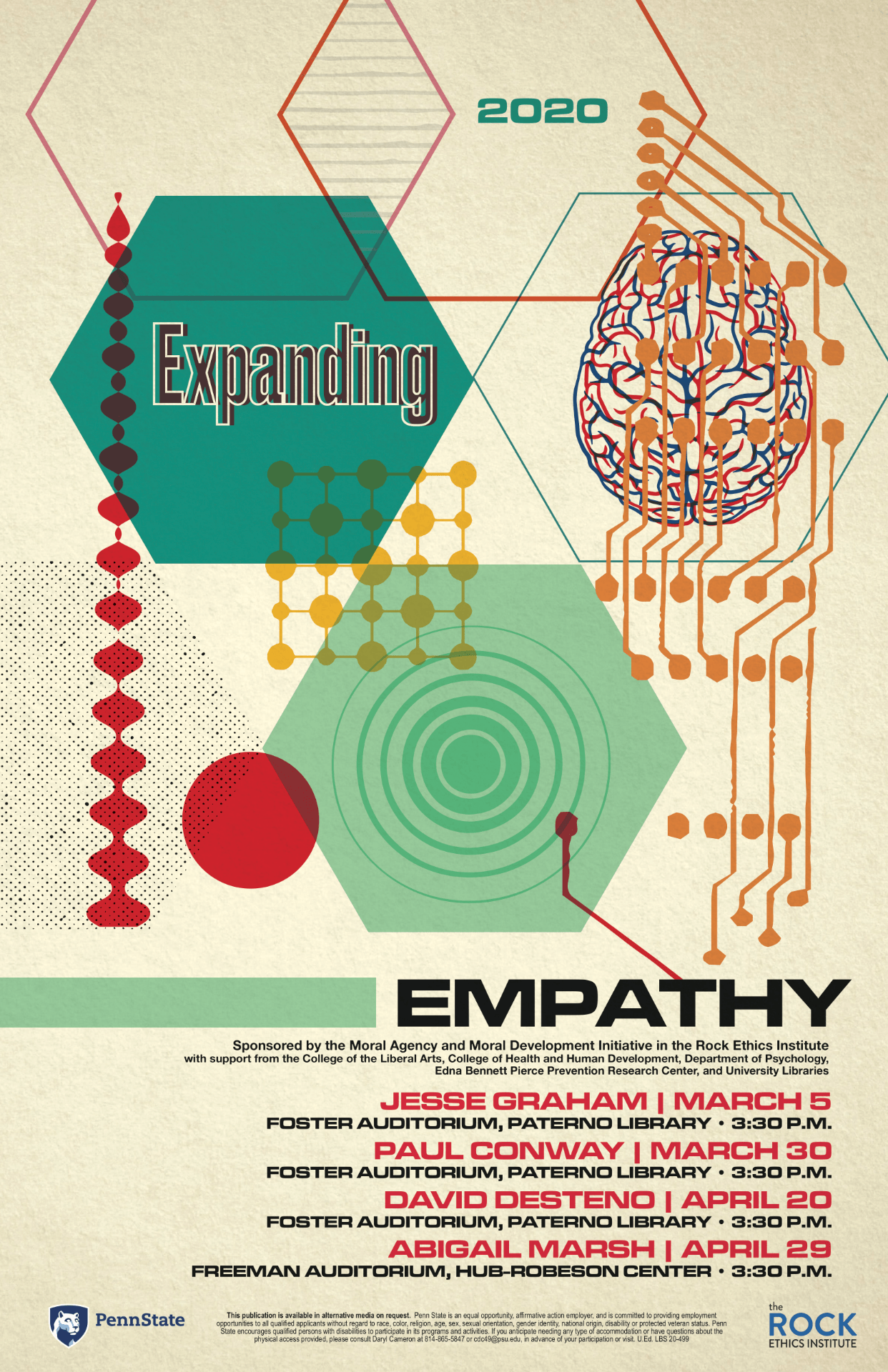
Posters by Tiny Little Hammers design
Expanding Empathy speaker series, Spring 2019
Mina Cikara (Harvard University), “Their Pain, Our Pleasure”
Thursday, January 24
Michael Poulin (SUNY Buffalo), “Must We Feel Bad to Do Good?”
Thursday, February 21
Kurt Gray (UNC Chapel Hill), “Explaining Moral Judgment”
Thursday, February 28
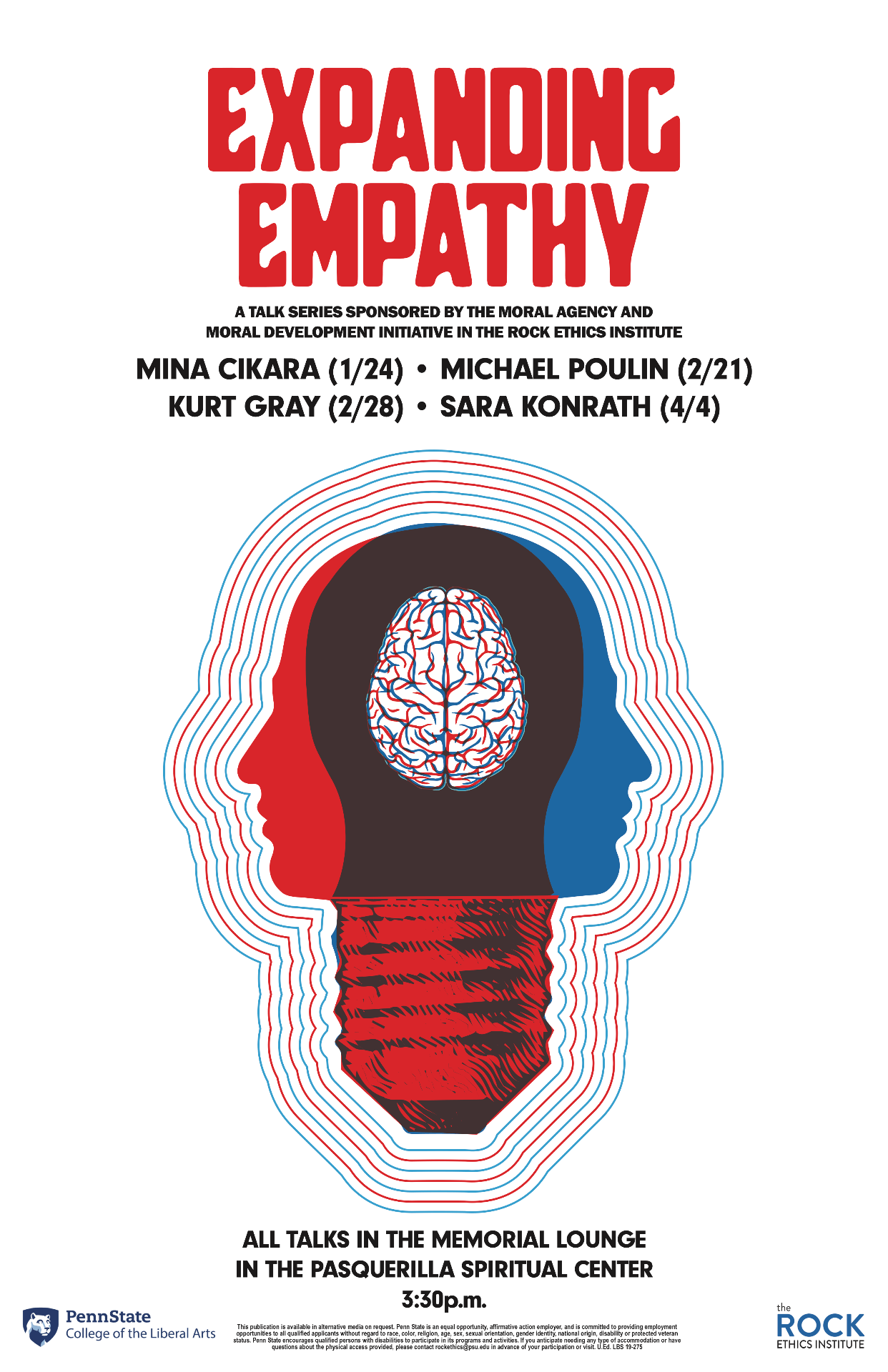
Posters by Tiny Little Hammers design
Moral psychology research group conference, fall 2017
The Moral Psychology Research Group (MPRG) is an interdisciplinary collective of psychologists, neuroscientists, and philosophers from around the world who meet twice a year to discuss and generate research projects related to moral decision-making, ethics, and cognitive science. In October 2017, Dr. Cameron and the Rock Ethics Institute hosted the MPRG conference, which included MPRG members, as well as a number of psychologists and philosophers from nearby universities.
The conference started on Thursday, October 5, with a public lecture by philosopher Walter Sinnott-Armstrong on the possibilities of building moral and ethical norms into artificial intelligence (3:30-5:00pm in Foster Auditorium, followed by responses by Dr. Cameron and Dr. Alan Wagner (Engineering). On Friday, October 6, and Saturday, October 7, the MPRG conference continued at the Penn Stater Conference Center with a series of talks and workshops by faculty from Penn State, as well as invited speakers from around the country.
Archive of Keynote by Walter Sinnott-Armstrong with Responses by Alan Wagner and Daryl Cameron:
View the full conference program here.

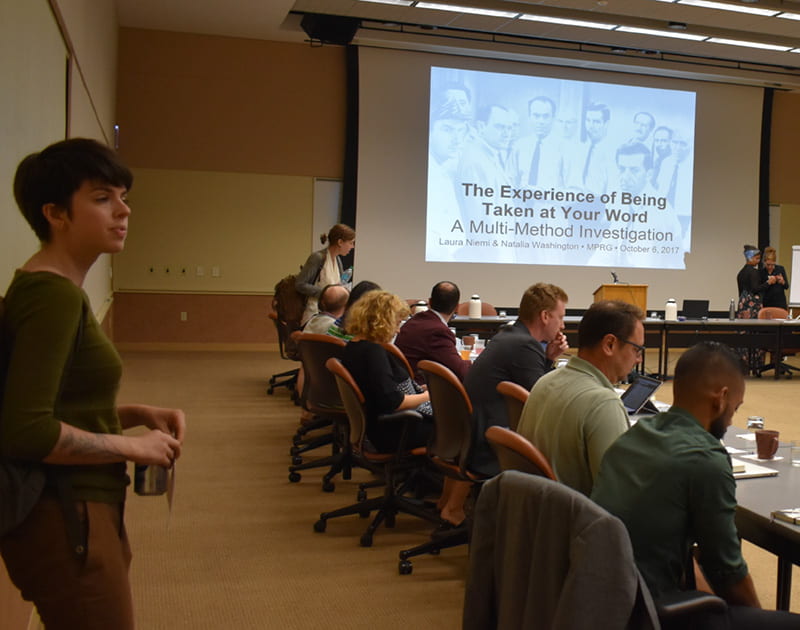
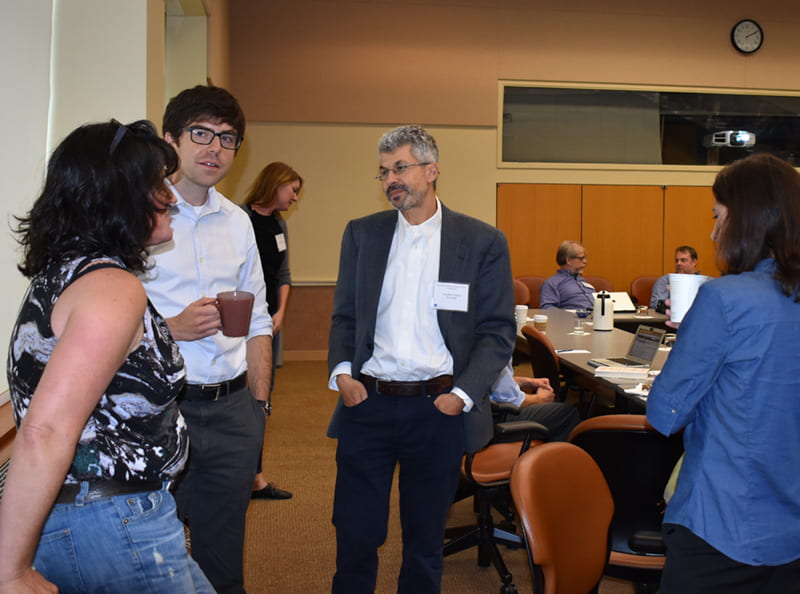
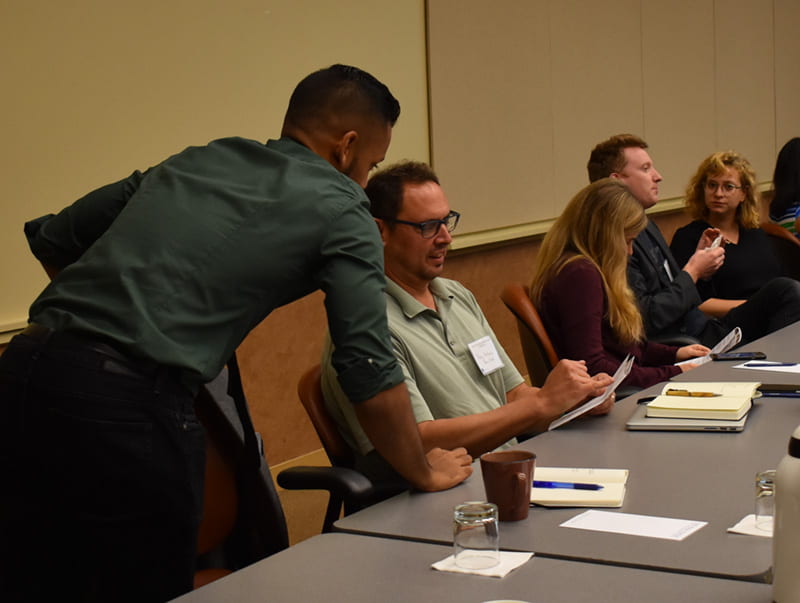
DIGITAL INTERVIEWS WITH ETHICS SCHOLARS
On the Relationship Between Science and Ethics
With Daniel Kelly, Stephen Stich, and Natalia Washington
On Interdisciplinary Approaches to Morality
With Derek Leben, Christopher Olivola, and Joshua Rottman
On the Moral Brain
With Joshua Greene, Anthony Jack, and Walter Sinnott-Armstrong
The study of moral psychology: how and why do people act ethically and make moral judgments?
With John Doris and Laura Niemi
Rock Ethics Institute Podcast: The Ethics of Empathy (Fall 2016)
With Michael Burroughs (Philosophy), Joshua Inwood (Geography), Alan Wagner (Engineering)
Moderated by Daryl Cameron (Psychology) and Rob Peeler.
We recorded the frame for this podcast right after the 2016 U.S. Presidential election, and in the main section, we have an interdisciplinary discussion about the ethics of empathy that happened right *before* the election. How does empathy play a role in collective activism? How do children learn empathy? Can robots learn and express empathy? And how can discussion across the sciences and humanities inform us about the limits and morality of empathy?